China's Grand Military Parade: A Display of Unity and Defiance
In a conspicuous display of unity and defiance, leaders of Russia, North Korea, and several other nations joined Chinese President Xi Jinping at a grand military parade in Beijing commemorating the 80th anniversary of the end of World War II. Xi Jinping emphasized the significant role both China and Russia played as major victor states
in the war and the joint responsibility of safeguarding the memory of sacrifices made by their peoples.
A Historic Commemoration Amid Tensions
The parade, held at Tiananmen Square, showcased China's military might and was interpreted by many as a stark message to the Western world. Russia's President Vladimir Putin and North Korea's Kim Jong Un were present, alongside leaders from Serbia, Slovakia, and a Taiwanese delegation, despite warnings from the ruling party in Taipei.
Xi Jinping's speech warned that the world is facing a choice of war or peace. He called for a truthful, fair, and pluralistic
shared memory of the war, pushing back against what mainland academics have described as Western historical nihilism
in the predominant account of the war.
A Show of Power and Alliance
The parade was marked by a grand display of Chinese military power, with Putin calling it 'brilliant'. The presence of Kim Jong Un, who has not visited China in over six years, signaled a potential realignment of Beijing-Pyongyang ties, according to observers.
Xi Jinping hailed the great regeneration of China
as he hosted the leaders. The parade was also seen as a platform for Xi to rewrite the history of World War II, particularly with regards to Taiwan.
International Reactions
The parade, however, drew criticism from Western leaders. Former U.S. President Donald Trump accused Putin, Xi Jinping, and Kim Jong Un of conspiring against the U.S. He urged President Xi to acknowledge the support and sacrifices the U.S. made in helping China secure its freedom during World War II.
Despite the absence of Western leaders, with the exception of Robert Fico, Prime Minister of Slovakia, the event was attended by 26 foreign heads of state and government. This was seen as a show of collective defiance amid Western pressure.
In Conclusion
The grand military parade in Beijing not only commemorated the 80th anniversary of the end of World War II but also served as a stage for China to display its military prowess and a renewed sense of unity with its allies. As the world watched, Xi Jinping's message of remembering the past and choosing peace over war resonated, albeit with mixed reactions. The event and its implications highlight the shifting dynamics in global power structures and alliances.

